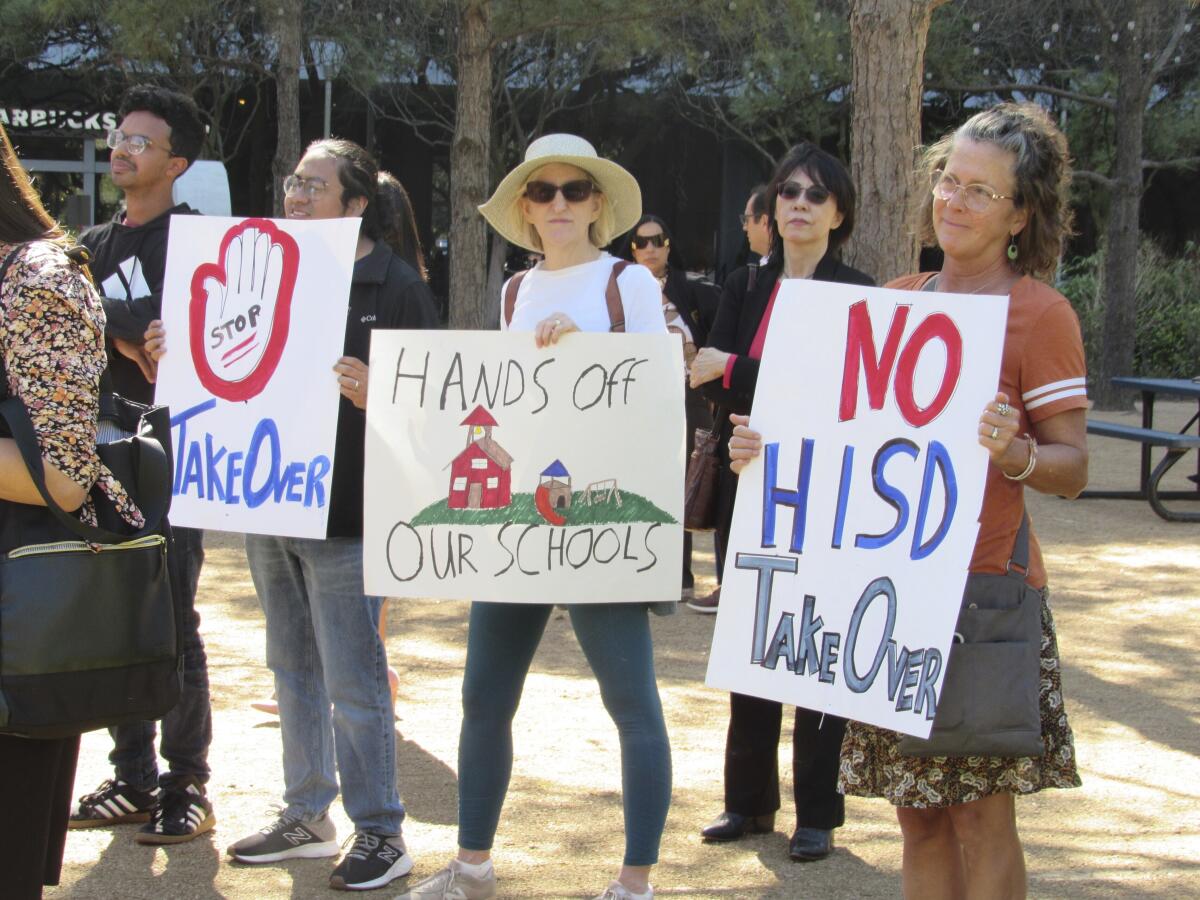Republican leaders in Texas announce takeover of schools in Democratic-led Houston

- Share via
HOUSTON — Texas officials on Wednesday announced a state takeover of Houston’s nearly 200,000-student public school district, the eighth-largest in the country, acting on years of threats and angering Democrats, who assailed the move as political.
The announcement, made by Republican Gov. Greg Abbott’s education commissioner, amounts to one of the largest school takeovers ever in the United States.
The takeover is the latest example of Republican and predominately white state officials pushing to take control of actions in heavily minority and Democratic-led cities. They include St. Louis and Jackson, Miss., where the Legislature is pushing to take over the water system and for an expanded role for state police and appointed judges.
In a letter to the Houston Independent School District, state Education Commissioner Mike Morath said the Texas Education Agency will replace Supt. Millard House II and the district’s elected board of trustees with a new superintendent and an appointed board of managers made up of residents from within the district’s boundaries.
Morath said the board has failed to improve student outcomes while conducting “chaotic board meetings marred by infighting” and violating the open-meetings act and procurement laws. He accused the district of failing to provide proper special education services and of violating state and federal laws with its approach to supporting students with disabilities.
He cited the seven-year record of poor academic performance at one of the district’s roughly 50 high schools, Wheatley High, as well as the poor performance of several other campuses.
“The governing body of a school system bears ultimate responsibility for the outcomes of all students. While the current Board of Trustees has made progress, systemic problems in Houston ISD continue to impact district students,” Morath wrote in his six-page letter.
Most of Houston’s school board members have been replaced since the state began making moves toward a takeover in 2019. House became superintendent in 2021.
Atlanta officials say a new training center would ‘reimagine’ policing. Activists say it would teach police urban warfare and destroy public forests.
He and the current school board will remain until the new board of managers is chosen sometime after June 1. The new board of managers will be appointed for at least two years.
House in a statement pointed to strides made across the district, saying the announcement “does not discount the gains we have made.”
He said his focus now will be on ensuring “a smooth transition without disruption to our core mission of providing an exceptional educational experience for all students.”
The Texas State Teachers Assn. and the American Civil Liberties Union of Texas condemned the takeover. At a news conference in Austin, state Democratic leaders called for the Legislature to increase funding for education and raise teacher pay.
“We acknowledge that there’s been underperformance in the past, mainly due to that severe underfunding in our public schools,” said state Rep. Armando Walle, who represents parts of north Houston.
An annual Census Bureau survey of public school funding showed Texas spent $10,342 per pupil in the 2020 fiscal year, more than $3,000 less than the national average, according to the Kinder Institute for Urban Research at Rice University in Houston.
The state was able to take over the district under a change in state law that Houston Democratic state Rep. Harold Dutton Jr. proposed in 2015. In an op-ed piece in the Houston Chronicle on Monday, Dutton said he has no regrets about what he did.
“We’re hearing voices of opposition, people who say that HISD shouldn’t have to face consequences for allowing a campus to fail for more than five consecutive years. Those critics’ concern is misplaced,” Dutton wrote.
Police are under growing scrutiny after changing their narrative of events during the school shooting Tuesday in Uvalde, Texas.
Schools in other big cities, including Philadelphia, New Orleans and Detroit, in recent decades have gone through state takeovers, which are generally viewed as last resorts for underperforming schools and are often met with community backlash. Critics argue that state interventions generally have not led to big improvements.
Texas started moving to take over the district following allegations of misconduct by school trustees, including inappropriate influencing of vendor contracts, and chronically low academic scores at Wheatley High School.
The district sued to block a takeover, but new education laws subsequently passed by the GOP-controlled state Legislature and a January ruling from the Texas Supreme Court cleared the way for the state to seize control.
“All of us Texans have an obligation and should come together to reinvent HISD in a way that will ensure that we’re going to be providing the best quality education for those kids,” Abbott said Wednesday.
Schools in Houston are not under mayoral control, unlike in New York and Chicago, but as expectations of a takeover mounted, the city’s Democratic leaders unified in opposition.
Race is also an issue because the overwhelming majority of students in Houston schools are Latino or Black. Domingo Morel, a professor of political science and public services at New York University, said the political and racial dynamics in the Houston case are similar to instances in which states have intervened elsewhere.
“If we just focus on taking over school districts because they underperform, we would have a lot more takeovers,” Morel said. “But that’s not what happens.”
Lozano reported from Houston and Weber from Austin, Texas. Associated Press writer Acacia Coronado in Austin contributed to this report.
More to Read
Get the L.A. Times Politics newsletter
Deeply reported insights into legislation, politics and policy from Sacramento, Washington and beyond. In your inbox three times per week.
You may occasionally receive promotional content from the Los Angeles Times.












